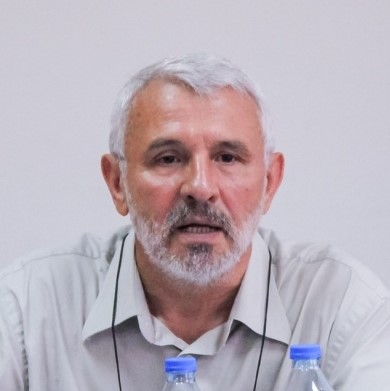‘Today, Ethical Questions Are Front and Centre’

The conference on Philosophy and Culture in Time of Pandemics ran from September 30 to 2 October 2021. It was divided into seven sessions held in a hybrid format. The organizers and participants discussed major topics such as social transformation during the pandemic, the role of mass media in shaping perceptions of the pandemic, and the epistemological and ethical issues that have arisen as a result.
The conference was organized by the HSE University School of Philosophy and Cultural Studies in collaboration with the HSE Faculty of Law, the Pirogov Russian National Research Medical University, the Department of Social Philosophy at the Russian Academy of Sciences, the Faculty of Philosophy of the Russian State University for the Humanities, and the Society of Professional Sociologists. Over 100 people took part in the discussions, including Russian and international experts.

Anastasia Ugleva, Head of the School of Philosophy and Cultural Studies
Our conference has been running for twelve years. We have set up our own space dedicated to internal dialogue and the exchange of ideas. We want to give a wider circle of colleagues the opportunity to review our results, debate them and join research groups.
At some point, we realized that the generalized nature of the conference was outdated, and that it would be more interesting and productive to narrow its focus. This changes the makeup of the participants and makes our goals more global in scope. What’s more, we are now engaged in major projects (such as our megaproject in applied ethics) that combine groups from multiple HSE departments, different campuses, and external colleagues.
Experience shows that students are benefitting from this decision too. Many are engaged in project work and have seamlessly adapted to the new format. I’d like to point out that the professionalism of our students grows from year to year. We have a lot of shared areas of interest and we have long viewed our students as colleagues.
The topic of the conference was prompted by our current reality. The pandemic brought people together, and the problems we discussed were of interest to everyone, despite the wide variety of fields represented (there were sessions on sociology, law, philosophy and cultural studies).
We wanted to shed light on the social, philosophical, ethical, and legal issues that have arisen as a result of the pandemic, as well as those that we have had to look at from a new perspective
We devoted a lot of attention to questions of medical philosophy and problems in modern public healthcare, timely issues at the crossroads of ethics and law, questions of responsibility and free will, and the so-called ‘infodemic.’
The inevitable conclusion is that social issues have become more acute, as has the need for collective problem solving in the fields of health, social and psychological adaptation to new circumstances, communication, self-presentation in the new space, and defending citizens’ rights. If we can’t solve these issues, it will be difficult to maintain social balance. Today, ethical questions are front and centre.
A society without morality is unsustainable. But morals are not a fixed thing; they transform, and are often ignored, but they become essential in times of global crisis

Jovan Babić, Professor of Ethics at the University of Belgrade, Serbia
I am interested in the issues of life and death and other issues in Bioethics. Also, I was always interested in the concept of human conflict (and its many forms). I hope that this might be a promising framework for future cooperation with HSE University. I plan to give a lecture there on Applied Ethics and its main problems later this year.
My talk at the conference was entitled Logic of Catastrophe – Deeper Logic of Reality. We are living in an age of a specific ideology of rights, and rights are usually taken as sacrosanct and inalienable. However, during catastrophes, we see the real nature of rights: an exchange of claims and privileges we make with each other, showing that rights are based in a deeper realm of reality, which is a set of basic long-term interests and constraints.
If we go even deeper into the logic of pandemics, in part independent of the logic of catastrophes, we can question whether the aspiration to avoid vaccination is valid at all. We can say that everybody has the right to jump off a bridge (with the intention to commit suicide) on the condition that not everyone does it, but we can also say that nobody has the right to push others off bridges (with the intent, for example, to see what happens). If the intent to avoid vaccination is more similar to pushing others from bridges than jumping off them, we may derive the conclusion that the ‘right to non-vaccination’ is not tenable at all, not even as an exception.
In a way, all this might be seen as the old skepticism issue. But if we include the concepts of temporality and responsibility (not to mention two other very important and basic concepts: fallibility and vulnerability), the matter becomes serious and, possibly, connected to a deeper layer of normativity: its valid and justified enforcement.
Session on the Ethics, Epistemology and Biopolitics of Medicine in the Era of Coronavirus
Ivan Kuzin, Instructor, HSE University School of Philosophy and Cultural Studies
Grigoriy Chasovskikh, Senior Lecturer, UNESCO Network Chair in Bioethics and International Medical Law at Pirogov Russian National Research Medical University
The majority of speakers examined ethical issues, predominantly those concerning applied and professional ethics. Another common theme was the COVID-19 ‘infodemic,’ its impact and ways of counteracting it. Multiple speakers discussed issues at the intersection of epistemology and ethics, examining the pandemic through the lens of epistemic virtues. Several speakers touched on ontological issues (the relationship between the body and mind, the interpretation of the virus as a process) and biopolitics.
Session on the Temporality and Topology of the Pandemic
Anna Ganzha, Associate Professor, HSE University School of Philosophy and Cultural Studies
The redirection and restriction of tourist flows and the transformation of recreational practices produced a unique collective cultural experience. This semi-voluntary experience forms a new realm full of forgotten discourse about homelands, nostalgia, blame, presence and admiration for the landscape.
Pressing ethical topics of discussion included inequality and the reintegration of the meaning of concepts such as ‘accommodation,’ ‘home,’ ‘work,’ ‘everyday time,’ and ‘working time.’ The specific structure of the pandemic’s affect has caused factors such as anxiety and uncertainty to function in a new way, locking them into a hopeless cycle. Other important issues of discussion included changes in temporal metaphorics and their transformation into a pandemic ‘war machine.’
Session on the Coronavirus and Geopolitics
Boris Kashnikov, Professor, School of Philosophy and Cultural Studies
In our session, we looked at the links between the pandemic and geopolitical issues. Our goal was to understand how centres of political influence have been changing during the pandemic. The pandemic is used as a way to gain leverage by fighting for prestige over one vaccine or another, as well as over proposed quarantine measures.
Our overall conclusion was that the issue of security in society is underdeveloped. Until now, it has been focused on threats such as war and terrorism, but it is philosophically unhelpful in the face of the pandemic. We have no ethical studies of the corresponding moral values on the global or national scale.
Session on Crisis Society: Meeting the Challenges of the Pandemic
Tatiana Sidorina, Research Professor, HSE University School of Philosophy and Cultural Studies
Anatoliy Ovsyannikov, Professor, RANEPA Institute of Business
The organizers and participants of this session set themselves the goal of addressing the issue of global epidemiological collapse in the context of a wide range of social issues. Key areas of focus included how modern society is living during the pandemic, what has changed in social measurement, whether society has fundamentally stayed the same, how social philosophy and social theory assess ongoing changes, and how social institutions react to changes during the pandemic.
Vladislav Karelin, Associate Professor, Russian State University for the Humanities Department of Social Philosophy
As part of the session on Crisis Society: Meeting the Challenges of the Pandemic, we held a roundtable on ‘The Epidemic as a Challenge: The Transformation and Deformation of Society.’
There are two main areas of pressing interest. The first concerns the understanding of issues in daily life through individual relationships to the experience of new activities and their corresponding social roles (vaccination, isolation and self-isolation, mandatory administrative practices, etc). The second concerns various aspects of wary attitudes to uncertainty and social crises that require new forms of social adaptation.
Session on Social-Philosophical Futurology
Nikolai Afanasov, Junior Research Fellow, Institute of Philosophy, Russian Academy of Sciences
While there was a wide range of topics at this year’s conference, we can divide them into several main areas: new and old forms of capitalism and their influence on the future, information technologies and our day-to-day lives, the political and legal aspects of the new world, and fantasy and literature as figurative modes of thought.
The joint work of participants demonstrated the lack of alternatives to capitalism as a unifying research lens. Inequality, loneliness, and decentralization of subjectivity have only become more pronounced during the pandemic. Both people’s inner world and the most abstract social norms are derived from existing resources. Information technologies are becoming not only an objective reality that reshapes the world, but also technological determinants of social processes.
There was a new addition to the session in the form of a block of presentations on the legal aspects of the behaviour of the pandemic and the digital future. It was prepared by students of the HSE University Faculty of Law (Yulia Erokhina’s Law and Culture project).
Session on the Ethics and Philosophy of Law
Anton Didikin, Professor, HSE University Faculty of Law
In this session, we discussed theoretical questions surrounding the formalization of ethical directives and the implementation of ethical indicators in the legal system of the modern state. The speakers highlighted examples of the successful implementation of formal and mathematical logical methods in legal discourse (which are similar in terms of regulating people’s behaviour), and ways of justifying the existence of moral foundations in any real or hypothetical system. The speakers also tried to shed light on the idea of value arguments, which is important in ensuring just legal decisions.
A selection of the most interesting presentations will be published. A conference primarily dedicated to ethical issues is currently planned for 2022.
Anastasia V. Ugleva
Associate Professor at the School of Philosophy
See also:
Early-Career Researchers Discuss Cooperation between Russia and Arab States
HSE University has hosted a conference entitled ‘Russia—The Arab World: Digital Future and Youth Cooperation,’ organised by the Faculty of World Economy and International Affairs (WEIA). The meeting took place in the run-up to the first Russian–Arab summit, due to be held in Moscow on October 15, 2025.
HSE and University of Campinas Celebrate World Logic Day Together
On January 15, 2025, the Russian-Brazilian Colloquium on Logical Pluralism was held at the HSE International Laboratory for Logic, Linguistics and Formal Philosophy to mark World Logic Day. This event was part of the joint project ‘Pluralistic Perspectives on Logic and Formal Philosophy,’ implemented by the laboratory and the Centre for Logic, Epistemology and the History of Science at the University of Campinas (Brazil) under the International Academic Cooperation competition.
Bringing Maths and Philosophy Together: Russian-Brazilian Project Explores Logical Pluralism
In late October and early November, HSE University hosted the Autumn School on ‘Logic and Formal Philosophy’ and a conference on logical pluralism as part of a collaborative project uniting Russian and Brazilian philosopher-logicians and mathematician-logicians. The project’s leaders and participants, Elena Dragalina-Chernaya, Itala Loffredo D'Ottaviano, Marcelo Esteban Coniglio, and Evandro Luis Gomes, shared their insights about the initiative.
‘Philosophy Is Thinking Outside the Box’
In October 2024, Louis Vervoort, Associate Professor at the School of Philosophy and Cultural Studies of the Faculty of Humanities presented his report ‘Gettier's Problem and Quine's Epistemic Holism: A Unified Account’ at the Formal Philosophy seminar, which covered one of the basic problems of contemporary epistemology. What are the limitations of physics as a science? What are the dangers of AI? How to survive the Russian cold? Louis Vervoort discussed these and many other questions in his interview with the HSE News Service.
Artificial Intelligence Tested by Kant Philosophy
The Baltic Federal University (Kaliningrad) recently hosted an International Congress entitled ‘The World Concept of Philosophy’ in honour of the 300th anniversary of the birth of the philosopher and thinker Immanuel Kant. The event brought together about 500 scientists and experts from 23 countries. HSE Rector Nikita Anisimov took part in the opening plenary session of the congress titled ‘Critique of Artificial Intelligence: Being and Cognition in the Context of Artificial Intelligence Development.’
The Perfect Trap: How the Relationship between Humans and AI Is Transforming
Artificial intelligence is increasingly becoming an integral part of our life. We are now so used to its help and services that we get completely lost when we can’t connect to the internet. Could a person fall in love with AI? What will its humanisation lead to? These and other questions were discussed at this year’s LSES Christmas movie seminar, which was dedicated to Spike Jonze's film Her.
Pivot to the East: A Comprehensive Study of the Cultural and Civilisational Centres of the Non-Western World is the Top Priority
China and the Chinese world, South Asia, Southeast Asia, the Arab countries, Iran, Turkey, Central Asia and Africa are gaining new significance in Russia’s foreign policy. However, we do not know enough about the Eastern countries. It is necessary to change the priorities in education, starting from grammar school. Prospects for the development of domestic Oriental studies in the context of the new stage in the development of the system of international relations were discussed at a round table at HSE University.
‘I Admire HSE Students’ Eagerness to Learn, to Discuss, to Broaden Their Perspectives’
Robert Romanowski was a ‘Digital Professor’ at HSE University in November 2021. In his interview for the HSE News Service, he talked about the specifics of online teaching, his course on Strategic Branding, and the skills that are essential for marketing professionals today.
Russia and Africa: Time to Expand Cooperation
There is major potential for economic and humanitarian cooperation between Russia and African countries. Particularly, Russian organisations and universities can help transfer competencies and knowledge in the fields of agriculture, energy, industrial production, environmental management, climate change, and public administration. Experts and representatives of African embassies in Russia discussed these issues at the round table ‘Russia-Africa Sharing Knowledge’ hosted by HSE University.
The Brain in Space: Investigating the Effects of Long Spaceflights on Space Travellers
As part of an international project conducted with the participation of Roscosmos and the European Space Agency, a team of researchers used differential tractography to analyse dMRI scans ofcosmonauts’ brains and found significant changes in brain connectivity, with some of the changes persisting after seven months back on Earth. The paper is published in Frontiers in Neural Circuits.


